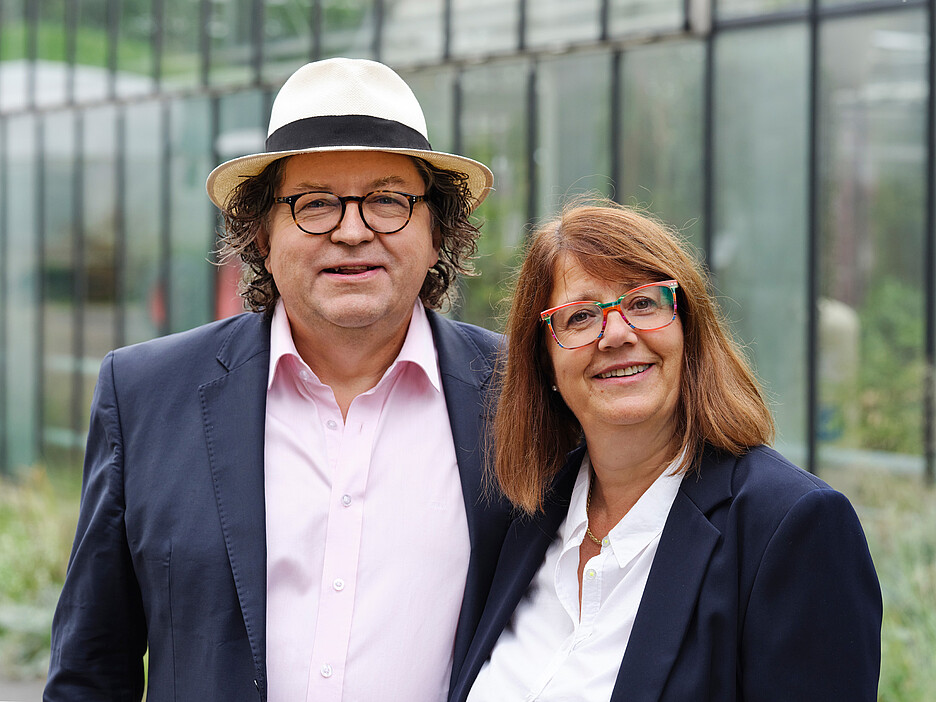
Planetary Health episode 5: Pixels, plants and processes – how food systems are becoming more resilient
In a world in which climate change, population growth and a scarcity of resources are becoming ever more present, we are faced with the challenge of redefining how we produce our food.
Technology alone will not be enough to save us – awareness, education, behavioural changes and the power of civil society will all be needed if we are to increase the resilience of our food system. The combination of traditional agricultural knowledge and modern technologies could provide the key to developing regenerative and more robust food systems. How might merging digital innovation with regenerative agriculture shape the food systems of tomorrow?
Pixels

Observation begins in a space in which virtual reality and real-time data provide us with a direct insight into arable land across the globe. Intelligent sensors and deep learning structures provide us with a platform to immerse ourselves in the “moment.” This insight is enhanced by a flow of information from sensors that record everything from soil pH values and moisture levels to the microbiome (the community of microorganisms in the soil that are essential for both nutrient cycling and soil health). The backbone of this digital ecosystem is formed by a data infrastructure that monitors every aspect of the agricultural cycle and supplements the weather forecast with the condition of the top metre of fertile soil. The aim is not only to harvest crops, but rather to also simultaneously collect data that can be used to optimise processes from a resilience-enhancing perspective.
Plants
This data is used to promote regenerative agricultural practices that aim to restore the soil, boost biodiversity and stabilise the local climate. Plants are not only viewed as a source of food, but also as key players in the carbon cycle. They are a part of this cycle and, together with microorganisms, microbes and the entire fauna, exert a major influence on the macrobiome (community of macroscopic – visible – organisms in an ecosystem or environment). New crops that are better adapted to climate change are identified and promoted.
Processes
The transition from batch processing to continuous processing is revolutionising food production. Real-time data detection systems are making it possible to optimise every processing step. From adjusting machine parameters based on deviations in the composition of the raw materials to the integration of client feedback through the analysis of social media – a great deal is controlled in real time. The diversity in the composition of raw materials is no longer being countered with a system of selection and rejection. Instead, process variations allow for inclusion and customised utilisation with the highest level of quality.
Products
The end result is food that is not only more nutritious, but also more sustainable. By placing a focus on regenerative processes, products are created that have a positive impact on both the planet and people. We are creating an exponential food system by reducing food waste, optimising our supply networks and monitoring food security. An exponential food system utilises a data-driven approach that enhances the efficiency and sustainability of food production through continuous processes that are optimised in real time. In doing so, it makes use of technologies such as machine learning and real-time analytics.
Urban farming and aquaponics
Access to fresh, high-quality food in urban areas represents an enormous challenge. Urban farming and aquaponics have the potential to make a contribution here. These approaches not only make it possible to cultivate food in urban environments, but also promote the local economy and reduce the associated environmental footprint by reducing the need for transport and storage. Aquaponics is a system that combines the cultivation of plants and the farming of fish. While the waste products of the fish are used as a source of nutrients to feed the plants, the plants in turn filter the water. These closed-loop systems may prove particularly valuable in areas where water is a scarce resource.
Genetic adaptations
Although genetically modified organisms (GMOs) are a topic of controversy, they can boost the resilience of plants to diseases, pests and extreme weather conditions. Scientific studies and responsible regulation are essential here in ensuring both food security and environmental integrity.
Nutritive enrichment
Algae, bacteria and fungi are all inconspicuous helpers in food production. Algae cultures are able to produce highly efficient, protein-rich nutritional raw materials in seawater tanks and bioreactors. Specialised microorganisms can produce food from waste products. Mycelium cultures not only offer benefits from a nutritional and physiological standpoint, but can also be used as a meat substitute. Using modified microorganisms, it is possible to produce nutrients as a basis for food in bioreactors. The media for this come from the agricultural sector, and this will remain necessary for a very long time to come.
Biotransformation – molecular upcycling
Cell cultures can likewise make a significant contribution to the decentralised production of food. While initial products are being launched on the market and consumed in various places around the world, these novel foods still have to prove their consumer safety in Europe. In particular, the challenges here lie with animal cell cultures and the production costs caused by the media and culture conditions. These hurdles are not quite so high in the case of fish and plant cells. For these culture techniques too, the culture media used to feed the cells come from primary agricultural production.
Continuous processing and real-time optimisation
Alongside urban agricultural innovations, exponential food technology is also highlighting the importance of efficiency, sustainability and health in the area of food production. Conventional food production, which is characterised by batch processes, is being revolutionised by continuous and self-optimising processes. The main elements of this technology comprise intelligent sensors, real-time feedback loops, predictive maintenance, the integration of client feedback, process redesign, supply network optimisation, sustainability metrics and AI-driven research and development. Switching from rigid, batch-based processes to dynamic, adaptable systems reduces food waste and improves process efficiency.
Alternative protein sources – plants instead of animals
Meat alternatives are becoming ever more important in our modern diet. While traditional meat consumption raises environmental concerns, plant proteins such as lentils, chickpeas and tofu as well as innovative meat alternatives produced using mushrooms, algae and insects offer more sustainable options that are healthier as part of a balanced diet. The aim here is to replace the protein powder extracted from plants by using complex, less processed raw materials from entire plant parts wherever possible, thus reducing the sometimes high degree of processing.
Technology dependency
Modern solutions are often more robust and, if implemented correctly, can facilitate a more stable supply chain. The key idea is already incorporating redundancy and diversity in the system at the planning stage (by design) as well as during construction (build in), which means that a single technological failure will not result in the paralysis of the system as a whole. Otherwise, the food system would become even more vulnerable than it already is today.
Decentralised, efficient and regenerative
The combination of urban farming and exponential food technology paints a picture of a future in which food production is decentralised, efficient and regenerative. Here, we are talking about a resilient food system in which everything revolves around plants, processes and products – optimised by pixels, the data that underpins intelligent systems. This might prove to be the way to achieve the necessary “environmental turn.”
The vision is clear: a world in which food production adapts to constantly changing requirements, counters climate change and, at the same time, ensures that as few people as possible go hungry and biodiversity is maintained.
Education will be key to realising this vision of the future. An informed population that adjusts its dietary behaviour, understands the technology and exploits the potential it offers together with global cooperation will ensure that this vision comes to pass. It will be a revolutionary journey, and it has already begun.

About the authors
Thinking and writing the unexpected is the motto of Gisela and Tilo Hühn, while their concept of life is underpinned by the endeavour to act responsibly together, adopt a reflective approach and make a difference. They work as researchers and lecturers at the ZHAW: Gisela Hühn as a member of the Food Process Development Research Group and Tilo Hühn as Head of the Centre for Food Composition and Process Design. Whether they are at the university or sat around their kitchen table, both enjoy joining forces or collaborating with others to discuss and work on future food systems and the question of how to get more of the goodness out of agricultural products during processing.
The “Planetary Health” series of the ZHAW’s “Impact” web magazine
Can our planet still be saved? And if it can, how? These are the questions addressed in the new “Planetary Health” series of the ZHAW’s “Impact” web magazine. As the content of the series is not yet set in stone, you –our readers – also have the opportunity to shape the path it takes and the issues it covers by sharing your suggestions and wishes. In the opening episodes of the series, ZHAW researchers Gisela and Tilo Hühn explain how we can save the world with food. The insights the researchers provide are by no means a light bite. Instead, they serve up a feast of information, detailing what is wrong with our food system and what negative impacts it has on the environment. While they don't offer any guaranteed recipes for ensuring our planet’s recovery, they plate up brain food aimed at promoting further thought and discussion. After all, “the battle to save the planet will be won at our dinner tables.” There is still a long way to go before we can sit back and enjoy a well-deserved dessert.
We look forward to receiving your ideas and suggestions directly below in the comments section.
0 Comments
Be the First to Comment!